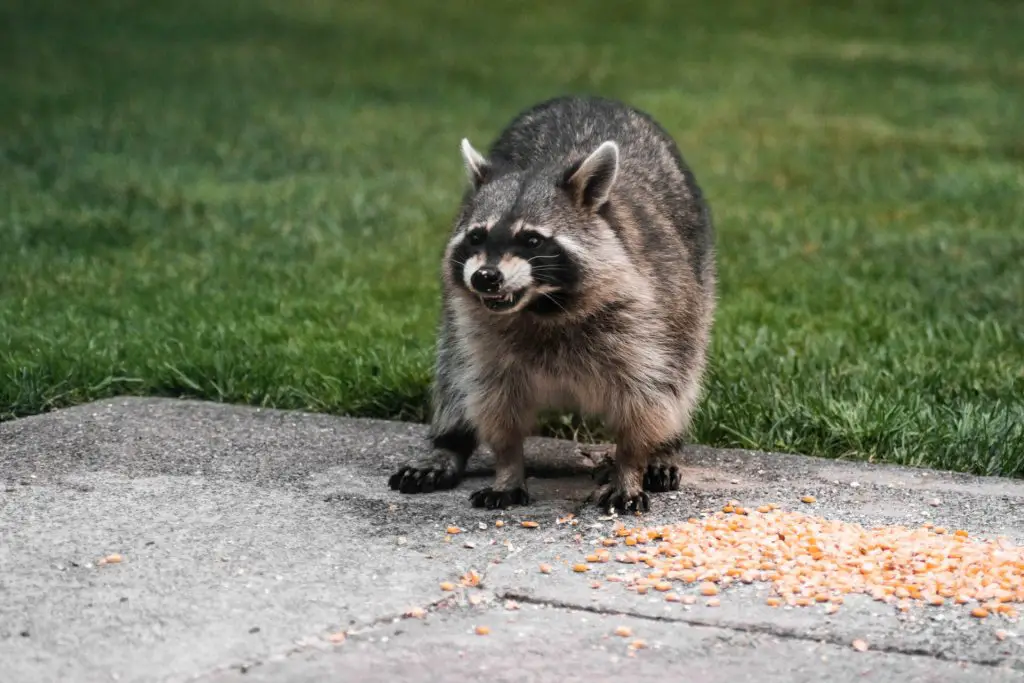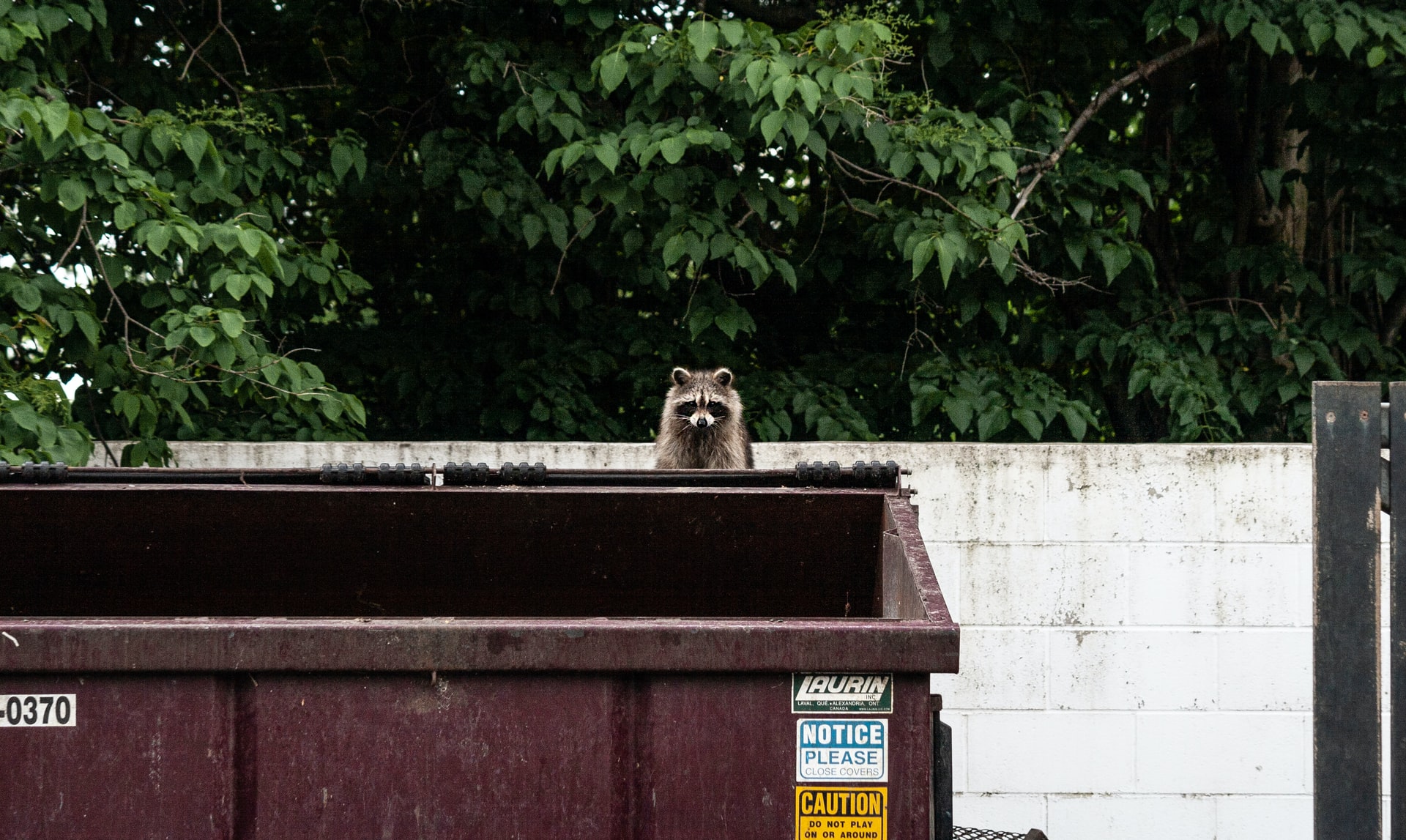Raccoons kill chickens to eat them. Raccoons typically attack at night when the chickens are most vulnerable. Raccoons are built to be excellent hunters, so attacking chickens makes for an easy meal for them.
Keep reading to discover details about raccoons’ attacks on chickens, signs to look for, and how to protect your backyard chickens.
Table of Contents
Do Raccoons Kill Chickens?
Raccoons are one of many chicken predators and will kill them no matter what type of area the chickens live in.
While other predators to chickens, like foxes and coyotes, may more likely be faced in rural areas, the threat of raccoons exists regardless of where the chickens are residing.
Raccoons are more likely to attack in the summer and fall since they are born in spring; as they grow, they start stocking up for winter hibernation when summer and fall arrive.
Since chickens can’t fly, can’t defend themselves, and are a tasty meal, they often fall victims to a hungry raccoon.
Do Raccoons Eat Chickens?
Raccoons are omnivorous animals, meaning they eat almost anything they can find, including insects, worms, rodents, fruits, vegetables, and snakes.
Chickens are one of their favorite foods. However, they rarely eat the entire adult chicken because the chickens are generally too large for a raccoon to carry.

They will usually only eat parts of the chicken, such as the legs or breast of the chicken.
Raccoons will often attack in family groups. They are messy eaters and will leave parts of the chickens scattered inside and outside the coop.
They also enjoy eating or carrying off the chicken eggs.
How Does a Raccoon Kill Chickens?
Raccoons kill chickens and eat them and their eggs by attacking chicken coops. They can climb fences and dig holes, making it easy for them to get to the chickens.
They sometimes attack through a small hole, either in the ground or on the fence, and they pull the neck or legs off of the chicken.
Raccoons have sharp claws and can grab objects firmly. Their teeth are just as sharp and can rip through the skin.
More than one chicken will often be killed in a raccoon attack; sometimes, the raccoon will only kill a few and then return to attack again.
Raccoons have a great sense of smell and can smell chicken feed, leading them to the coop.
5 Key Signs a Raccoon Killed Your Chickens
An attack from a raccoon will be gruesome in which owners find their chickens mutilated and scattered.
Below are signs that a raccoon may cause the death of your chickens:
- Usually, the head, comb, and breast are missing from chickens attacked by raccoons.
- Look for raccoon tracks, which will have the entire impression of their foot made up of five digits that are spread out.
- Raccoons are noisy animals, and their growls, hisses, and high-pitched chatters may give their presence away.
- Raccoon waste does not have a strong smell, but raccoon scat is about 1-3 inches long and will be found scattered around the coop.
- If the attack occurred at night, it was most likely a raccoon since they are nocturnal.
If the chickens have neck injuries or the heads of chickens are neatly stacked, you may be dealing with a weasel instead of a raccoon.
Can Raccoons Bite Through Chicken Wire?
Raccoons can bite through chicken wire, tear it, dig under it, and reach through it. They are also good climbers, which is another reason the chicken wire is ineffective.
Chicken wire should only be used to keep chickens in and where you want them to be, rather than be used to keep predators out. This is not an effective method of keeping predators like raccoons away because it is not strong or sturdy enough.
Using hardware cloth attached to the chicken wire with poultry clips is harder for raccoons to get through.
Raccoons hunt lazily, so working hard to get into the hardware cloth is not something they will typically attempt.
How To Protect Your Chickens From Raccoons?
1. Get Good Latches
Raccoons can open simple latches with their hands, so one step you can take to prevent raccoons from attacking your coop is to have latches that are difficult to open or latches that have multiple steps involved to getting it open; even a padlock with a key or code will work.
2. Seal Feeds
Using a locking lid to seal your feed will help contain the enticing smell of the feed; also, remember to clean out feeders at night.
3. Collect Eggs
Collecting eggs regularly will help protect chickens. Keep baby chicks inside the coop until they are ready to go out, making sure they roost before dusk.
4. Build sturdy Walls
Another step chicken owners take is to have sturdy walls around the coop and discourage the chickens from roosting near the edges or the coop door, where they could easily be attacked.
5. Secure Garbage Cans
Make sure your garbage cans are secured in tightly sealed bins.
6. Try Motion Lights
Flashing lights or motion lights will be effective briefly, but raccoons will eventually get used to the lights and will start to ignore them as they continue to return to your coop.
7. Check For Holes
Something else you can do to protect your chickens is to check the coop daily for holes or any other spots where a raccoon could slip in and immediately repair the area.
Raising chickens is not a simple task, and the destruction that raccoons cause can be devastating to chicken owners.
Use these techniques to avoid dead chickens and focus on keeping chickens thriving safely.

